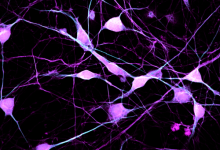The NINDS Intramural Program encourages scientific interactions and collaborative research projects. The NINDS supports a number of Core Facilities and services that provide state-of-the-art equipment and expertise to support intramural NINDS investigators. Additional NINDS-partner and NIH-wide facilities are also available to researchers.

Animal Health and Care Section (AHCS) / Animal Care and Use Committee (ACUC)
The Animal Health and Care Section (AHCS) provides a comprehensive program of animal care and use for intramural investigators. The AHCS, in conjunction with the Animal Care and User Committee (ACUC), participates in assuring that the Institutes' Animal Care Program is in compliance with all applicable regulations, guidelines, and policies. For more information, contact Nancy Hitt, V.M.D.,.
The Bioinformatics Core Facility
The Bioinformatics Core Facility consists of both Bioinformatics Scientist-staff and Bioinformatics Programmer-staff. Its mission is to collaboratively assist NINDS research staff with Bioinformatics-related projects as needed. For more information, contact Kory Johnson, Ph.D.,.
The Biospecimen Core
The Biospecimen Core was established in the fall of 2021, to provide sample acquisition and processing, sample tracking, storage, and sample shipment support. The core will first focus on establishing standard operating procedures, and maintaining a database on clinical information and laboratory results on each of patients from whom the specimens are acquired. For more information, please contact Niru Amin, Ph.D.,.
The Electron Microscopy (EM) Core
The Electron Microscopy (EM) Core Facility facilitates NINDS investigators with the opportunity to use electron microscopic techniques in their research programs. The staff provide assistance in all aspects of electron microscopy including project planning, specimen preparation and training. For more information, contact Jennifer Petersen, Ph.D.,.
The Flow & Imaging Cytometry Core
The Flow & Imaging Cytometry Core Facility provides intellectual, technical, training and collaborative support to NINDS and other intramural investigators in both basic and clinical research programs requiring seamless and productive use of conventional flow cytometry, imaging flow cytometry, preparative fluorescence-activated cell sorting (FACS), and in situ cytometric imaging techniques to assay cell biology at the molecular, subcellular and cellular levels, as specified by the investigator. For more information, contact Dragan Maric, Ph.D.,.
The Light Imaging Core
The Light Imaging Core Facility (LIF) provides intramural scientists with access to state-of-the-art light imaging equipment and expertise in light imaging techniques. For more information, contact Carolyn Smith, Ph.D.,.
The Mobile Clinical Research Unit
The Mobile Clinical Research Unit (MCRU) aims to develop a model for bringing mobile, innovative, non-invasive magnetic resonance imaging (MRI) and optical coherence tomography (OCT) technologies to rural and underserved populations. The study team is especially interested in the use of portable MRI and OCT, both non-invasive imaging tests with the potential to capture signs of neurological disease. For more information, please contact Silvina Horovitz, Ph.D., team lead.
The Proteomics Core
The Proteomics Core Facility provides amino acid sequencing of purified proteins/peptides for NINDS investigators. The facility is also available for collaborations involving protein/peptide purification and more complicated sequencing strategies. For more information, contact Yan Li, Ph.D.,.
The Clinical Proteomics Unit
The Clinical Proteomics Unit uses state-of-the-art mass spectroscopy based techniques to decipher the proteome in the cerebrospinal fluid and other biological materials. For more information, contact Yan Li, Ph.D.,.
The Quantitative MRI (qMRI) Core
The primary goal of the Quantitative MRI (qMRI) Core Facility is to provide PIs access to research MRI resources developed within and outside NINDS, and to assist in their implementation as endpoints in clinical trials of neurological diseases. For more information, contact Govind Bhagavatheeshwaran, Ph.D.,.
The Translational Neuroscience Center
The Translational Neuroscience Center (TNC) provides an infrastructure to assist researchers in pre-clinical and clinical studies to develop new diagnostics and treatments for neurological diseases.
The TNC is comprised of two units:
- Drug Development Unit, directed by Joseph Steiner, Ph.D. This unit provides assistance with development of throughput assays for identified targets for drug development using primary brain cells or stem cell derived neuronal and glial cells. For more information, contact Dr. Steiner.
- Neurodifferentiation Unit, directed by Tongguang “David” Wang, Ph.D. This unit delineates new techniques for converting blood derived stem cells into neurons to develop personalized medicine and study disease pathogenesis. Contact Dr. Wang.
The Clinical Trials Unit
As a part of the Office of the Clinical Director, the Clinical Trials Unit (CTU) is a group of clinical research experts who collaborate to provide NINDS intramural investigators with support in developing and executing clinical research studies, as well as regulatory guidance. For more information phone (301) 594-6874 or e-mail the Clinical Trials Unit (CTU).
Neurological Consultation Services
The NINDS Intramural program provides neurological consultation services to the NIH Clinical Center with 24/7 coverage, 365 days a year, through the Neurology Consult Service. The service is staffed by neurological care providers who serve the patient care goals of the Clinical Center with diligence and attentiveness. The service includes weekly consult conference rounds every Friday morning and outpatient clinic days on Tuesday and Wednesday. Emergent consultations should be obtained via activating the brain code services. For more information, contact Warren Brown.
